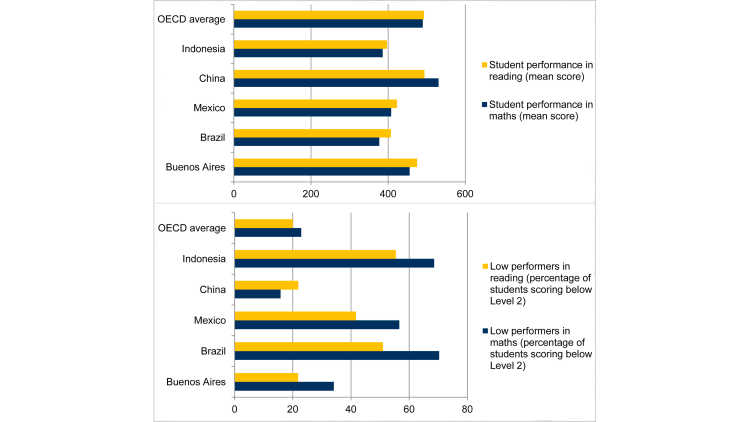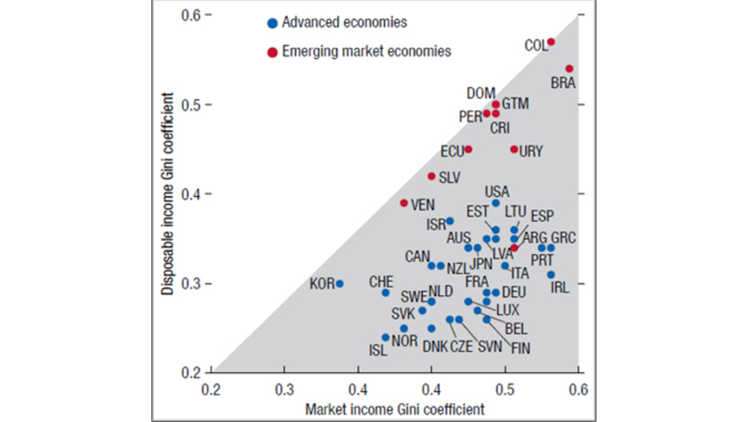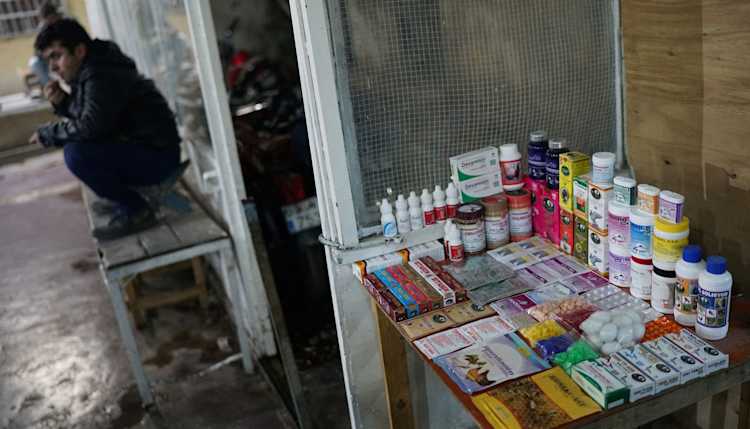- Home
- Publications
- GIGA Focus
- The G20 under Argentina's Presidency: Time to Deliver on the Hamburg Promises
GIGA Focus Global
The G20 under Argentina's Presidency: Time to Deliver on the Hamburg Promises
Number 6 | 2017 | ISSN: 1862-3581

On 1 December 2017, Argentina took over the presidency of the G20 from the German government. This is the right time to briefly review the year of the G20 under a German presidency in troubled times. It is also a prudent time to look ahead and provide a preliminary assessment of the priorities set by Argentina.
The G20 under the German presidency has displayed flexibility, avoided deadlock, and – despite the protests – started to address its legitimacy problems. The Hamburg summit recognised that the gains of globalisation have not been shared widely enough, and 19 members of the G20 reaffirmed their commitment to the Paris Agreement. Yet, the summit did not deliver concrete actions.
The Argentine presidency will have to keep the G20 alive and functioning, but the club will also have to demonstrate that the commitment to “shape globalization to benefit all people” does not turn out to be an empty promise.
The Argentine government has set three priority issues for its G20 presidency: the future of work, infrastructure for development, and food security – topics on which some consensus is likely to be found. The proposal stresses the need for greater involvement of the private sector, particularly in terms of financing infrastructure.
The G20 summit in Buenos Aires risks becoming a lost opportunity. The current Argentine proposal for the agenda is not ambitious enough, and it sends the wrong signals. Instead of managing adjustment, it overemphasises the need to enable people to adjust. Further, too much emphasis is placed on increased private-sector involvement – be it in infrastructure or agriculture.
The summit in Buenos Aires presents an opportunity to start considering the concrete steps to achieving more inclusive growth through a fairer globalisation. The solution cannot be to turn yet more public assets into private ones.
Policy Implications
On 1 December 2017, Argentina took over the presidency of the G20 from the German government. This is the right time to briefly review the year of the G20 under a German presidency in troubled times. It is also a prudent time to look ahead and provide a preliminary assessment of the priorities set by Argentina.
The G20 under the German Presidency: A Diplomatic Success …
Most observers judge the “performance” of the G20 under the German presidency as successful. Narlikar (2017), for example, considers the G20 summit of 2017 a landmark moment, as it was able to reach a joint declaration in a time of a backlash against globalisation. From this perspective, the joint declaration can be considered a major achievement mainly because a consensus was reached that recognises that economic growth needs to become more inclusive and that the gains of globalisation have to be shared more widely. Further, the response to the US administration’s withdrawal from the Paris Agreement – the 19 other G20 members acknowledging the US decision while reaffirming their own and the group’s commitment to the agreement – was probably the best option for a diplomatic work-around, and it helped preclude the summit’s failure.
The G20 was able to avoid deadlock in Hamburg, and I would thus tend to side with the above optimistic interpretation of the summit in terms of its diplomatic success. As is obvious from the above account, one’s judgement of the G20 in 2017 is also a matter of a counterfactual: the forms that alternative scenarios might have taken. It is not unthinkable that a Leaders’ Declaration – with all its annexes – might not have been agreed upon. Further, it is also conceivable that other countries might have used the US positions on trade and climate to challenge previous consensus views and international agreements in order to cater to domestic politics or for other tactical and strategic purposes.
The main reason for the G20’s diplomatic success in Hamburg was its flexibility, a quality that was particularly important in 2017 and is likely to remain so under the Argentine presidency. The Hamburg summit – and its prior work in the working groups and ministerial meetings – provided a testing ground for international cooperation with a largely unpredictable US administration. The G20’s constitution as an informal process has allowed the group to fulfil that function and, in this sense, the G20 has played an important complementary role to the UN, other international organisations, and further treaties that are being undermined by the US administration. Although a further weakening of international organisations is a real risk, this risk did not originate within the G20. Instead, the working groups are an important vehicle for a number of international organisations to bring awareness of their work to government officials who would otherwise be more concerned with domestic matters.
It has been pointed out by various observers (Narlikar 2017; Berger 2017) that the G20 first started to address its legitimacy problems under the German presidency. Though the protests in Hamburg suggest otherwise, the G20 made an explicit attempt to engage more seriously with diverse stakeholders in the run-up to the summit. In particular, the German government has supported and actively taken part in the so-called “engagement groups” of the G20 – for example, the C20 (civil society organisations), the T20 (think tanks), and the L20 (labour groups and trade unions).
In 2017, the G20 proved a relatively robust process capable of maintaining a certain level of international cooperation. Keeping this process alive and functioning will be one of the main tasks of the Argentine presidency.
… But Progress on Key Issues Was (Very) Limited
Unfortunately, the current level of cooperation between the G20 members is insufficient to address the urgent global problems the world faces, in particular climate change and a renegotiation of the terms of globalisation. The G20 has thus maintained and even augmented its diplomatic importance, but in terms of substance much remains to be delivered. This is not to downplay the importance of the G20 as a process. It is also not to say that substantial progress would have been politically feasible in 2017. Yet, it is necessary to say that progress on two key global challenges is insufficient.
First, clearly and without doubt, progress remains insufficient with regard to climate change. This is not only because of the position of the US administration. It is also because the reaffirmation of the commitment to the Paris Agreement by 19 member countries does not suffice. Effective progress on nationally determined contributions (NDCs) (and beyond) is required, and domestic actions must be taken accordingly. Because of the importance of domestic actions for the Paris Agreement, the loose G20 club is a good place to coordinate and leverage progress in individual G20 member states, which are responsible for the lion’s share of worldwide emissions, even without the United States. Coordination among the G20 would thus help overcome the coordination problem that is inherent to the United Nations Framework Convention on Climate Change (UNFCCC). While the Leaders’ Declaration promises to move “swiftly towards its [the Paris Agreement’s] full implementation,” the agreed-upon G20 Hamburg Climate and Energy Action Plan for Growth, to which the United States has made its position clear, contains hardly any concrete actions. It is particularly unsatisfactory that the Hamburg summit was not able to move forward in setting a timeline to phase out fossil fuel subsidies (Hansen 2017).
Second, it has been argued that a major achievement of the Hamburg summit was the recognition that globalisation “has created challenges and its benefits have not been shared widely enough” and, consequently, that globalisation needs “to be shaped to benefit all people” (G20 Leaders’ Declaration). It is remarkable that it took until 2017 for the world’s leaders to collectively realise this key challenge of our times. For example, it has long been known that real US wages have been stagnant since the 1970s despite considerable economic growth. Further, numerous studies have shown that liberalisation and opening-up of economies creates winners and losers and can have adverse distributional implications in developing country contexts as well. The problem is not only that the benefits have not been shared widely enough; the gains have often accrued to those who were better off already, while the losers tend to be those with little capacity to adjust – meaning, again, not the richer segments of the population. There is thus a link between the rising inequality and globalisation – and the interrelated accelerated speed of technological change that has accompanied it – that is not sufficiently acknowledged in the declaration. The necessary debate and exchange about policies for a “fairer” globalisation should therefore explicitly address within-country inequalities and go beyond a discussion of mitigating adjustment costs. In terms of concrete actions for a more inclusive globalisation, Hamburg had little to offer. But maybe more is to be expected from Buenos Aires?
Argentina’s Priorities
Neither trade nor climate change are among the priorities of the Argentine government for the summit in Buenos Aires. Instead, President Macri proposed the following priorities for the G20’s agenda in 2018: (1) the future of work and what this implies for education, (2) infrastructure for development, and (3) food security (see G20 Argentina website 2017). These priorities are more topical and concrete than the more comprehensive agenda of the German presidency, “building resilience, improving sustainability, and assuming responsibility.” Further, the Argentine government has emphasised that it does not see itself representing only a single country, but the entire region of Latin America.
The Future of Work
With regard to the future of work, Macri specified that “adopting technological advances” should “not lead to economic exclusion or other negative side effects” and that this requires investment in training and skills. Many expect digitalisation, after globalisation, to send the next wave of economic shocks through the world’s labour markets. A T20 policy brief (Frey 2017) entitled The Future of Jobs and Growth: Making the Digital Revolution Work for the Many stresses the importance of enabling workers through training – in line with Macri’s statement – in combination with measures to facilitate job reallocation. More flexible occupational licensing requirements and “relocation vouchers” would help workers move to regions where digitalisation is creating new jobs. The role of the G20 could be to act as a platform to share policy experiences and best practices.
Enabling people to adjust to new workplaces is easier said than done if the basis for acquiring “adjustment skills,” in particular a solid secondary education, is weak. As illustrated for selected middle-income G20 countries and the average OECD country in Figure 1 below, the educational basis in reading/writing and maths, on which these skills would have to build, differs vastly across G20 countries. China today shows educational achievement close to or (in maths) even higher than the OECD average. The country thus clearly outperforms those of its Latin American G20 peers with similar levels of income per capita: Brazil and Mexico.
Note that the PISA (Programme for International Student Assessment) studies aim to assess “the extent to which 15-year-old students, near the end of their compulsory education, have acquired key knowledge and skills that are essential for full participation in modern societies.” While PISA tests knowledge reproduction, it also examines how well students can apply acquired knowledge to unfamiliar settings, both in and outside of school. It is obvious that these “transfer skills” will be decisive for the success of the training measures intended to facilitate adjustment.
What is almost more worrying than the low average levels of educational achievement in some G20 member states is the very high inequality of educational outcomes, illustrated here by the share of students that lack fundamental skills in maths and reading and writing. In Brazil and Indonesia, more than 50 per cent of 15-year-old students demonstrate deficiency in reading/writing skills (60 per cent in maths). This compares to a roughly one-fifth of students with these deficits in the OECD countries on average. The G20 host country, Argentina (here, results are available only for Buenos Aires), performs relatively well.

These PISA results are indicative of the high risk that many people in G20 countries will be left behind by digitalisation. There is an urgent need to better prepare the young for the digital age, in particular in middle-income countries with high levels of inequality in income and education. Educational inequality is of course closely related to inequalities in resources and income, so policies to tackle income and wealth inequality are relevant to educational inequality – and vice versa.
Finally, while the focus on enabling people to adjust is right, there are likely to be limits to people’s adjustment capacity – even if they are better-trained and endowed with reallocation vouchers. Although politicians find it more attractive to manage growth, the equally important aspect of adjustment policies entails managing decline. This may include temporary subsidies and structural policies that mitigate the adverse effects of technological change on those with limited capacity to be retrained and relocated.
Infrastructure for Development
In the second priority, “infrastructure for development,” the Argentine presidency stresses the need to fill the gap in infrastructure investment in many G20 member states. Its main proposal to achieve this is to mobilise private capital by establishing infrastructure as an asset class (G20 Argentina website 2017). This proposal builds on and extends the agreement reached at the Hamburg summit in which the G20 endorsed the “Hamburg Principles and Ambitions” on boosting the role of private finance. This common framework allows us to quantify the ability of multilateral development banks to secure private funds, and the G20 agreed to a target of increasing mobilisation by 25 to 35 per cent over the next three years (Bundesregierung 2017).
It is true that the G20, in its finance track, would be the appropriate forum to discuss ways to more effectively mobilise international private finance for infrastructure investment. However, it should not be ignored that turning – typically publicly owned – infrastructure into an “asset class” held by private investors implies yet more privatisation of state-owned assets. This may not be desirable, as it may further fuel inequality. The large-scale privatisations of the 1990s and 2000s have been found to be an important driver of increasing wealth inequality throughout the world (Word Inequality Report 2017).
It may sound repetitive to those who have been following the policy discussion surrounding the Hamburg summit, but instead of emphasising the need for the mobilisation of private capital, the G20 should focus on strengthening and reorienting investment strategies “to exploit the significant opportunities of low-carbon, climate-resilient infrastructure” (Bak et al. 2017). In addition, it is with regard to infrastructure investment where the G20 has major stakes and influence in non-G20 member countries. Think of the Chinese “One Belt, One Road” strategy, or indeed the G20’s “Compact with Africa” initiative, which illustrates how the G20 can provide a platform for increased cooperation and coordination. Continued attention of the G20 to the Compact with Africa under the Argentine presidency would also keep up the momentum of the G20’s partnership with Africa, which may otherwise lose impetus in 2018.
Food Security
The third priority theme of the Argentine presidency, food security, is not at all a new issue to the G20. Previous summits have dealt with food security, starting with the Food Security and Nutrition Framework in 2014 under the Australian presidency, continuing with the Food Security Action Plan in Antalya in 2015, and a proposal on good practices on family farming and smallholder agriculture in Hangzhou in 2016 (see Bundesregierung 2017, for the documents; Gulati, Kharas, and von Braun 2017). To that list, Hamburg has added the G20 Initiative for Rural Youth Employment. It is understood that the challenge of food security requires (a) increasing agricultural productivity and closing productivity gaps, also in light of climate change, (b) paying particular attention to family farming and rural off-farm employment, especially for the youth, and (c) reducing vulnerability to temporary loss of food security (G20 Initiative for Rural Youth Employment at Bundesregierung 2017; Gulati, Kharas, and von Braun 2017).
This said, it remains to be seen where exactly Argentina sees (or wants to see) the debate on food security moving. In his opening speech, Macri pointed out that “agricultural lands are the natural resource that produces most of our food, but they are limited and non-renewable. Their preservation is crucial. This is where the G20 can lay the groundwork for more public–private partnership.” It is not obvious why the issue of land preservation is linked to the need for more public–private partnerships. In fact, the G20 Initiative for Rural Youth Employment “acknowledges that an increase is needed in responsible public- and private-sector investments and financing for responsible private-sector investments to support dynamic economies that deliver services, facilitate decent work and generate business opportunities and income for the next generation.” The double use of “responsible” in combination with a strong emphasis of the Voluntary Guidelines on the Responsible Governance of Tenure of Land, Fisheries and Forests in the Context of National Food Security (VGGT) and the Principles for Responsible Investment in Agriculture and Food Systems (CFS-RAI) is not typical for a G20 document and reflects the concerns that have been raised by many regarding the sustainability and socio-economic impacts of large-scale agricultural investment in recent years (Nolte, Chamberlain, and Giger 2016).
Inequality: The Missing Link
It may indeed not have been the cleverest strategy to put the potentially divisive themes of climate and trade at the top of the agenda for Buenos Aires. Given the above assessment, it is apparent that the summit will be able to produce some consensus on the priorities chosen by Argentina – maybe even along the suggested lines: for example, in terms of more private involvement in financing infrastructure. However, if the Hamburg summit really marked an important shift in the G20’s thinking, including “a widespread recognition that the nations of the world as a whole must make progress in stopping climate change and in overcoming inequalities and pockets of poverty” (Snower 2017), too little of this recognition can be seen in the Argentine agenda as of now.
The summit in Buenos Aires presents an opportunity to start thinking about what concrete steps such recognition would imply. And it is obvious that the solution cannot be found in turning yet more public assets into private ones. Putting inequality – or, if you like, “inclusive growth” – on the agenda would have helped. However, it is also a topic that can (still) be mainstreamed into the Argentine priorities – for example, by addressing the inequalities in educational opportunities, and linking the issues of investments in infrastructure and agriculture to inclusive growth.
Reducing inequality should be a cross-cutting theme of the G20 – in Buenos Aires and beyond – as it is very closely linked to both the impacts of digitalisation on labour markets and the debates about a fairer globalisation. In fact, it seems to be often overlooked that these two debates have much in common and are closely interrelated. Much can be learnt from the labour market impacts of globalisation and the policies that have or have not worked (or should have been in place). For example, in particular in the United States, economic decline in some regions has not been well managed. And recent evidence from developing countries also hints at long-lasting negative effects of adjustment on inequality.
Further, the speed with which digitalisation is spreading and how it affects worldwide patterns of production and, eventually, labour markets will be determined to a large extent by the international trade and investment regime. Thus, fairer global trade governance will have to address these future structuring elements of the world economy, in particular trade in “digital services.” Finding the right policies and the right modalities of openness to achieve a more inclusive pattern of economic growth will not be an easy task.
So far, the connections between trade, digitalisation, and equity have not manifested meaningfully in the G20’s declarations. Yet, the Hamburg Action Plan contains a list of domestic policy measures meant to promote inclusive growth. This list includes youth employment and entrepreneurship programmes, transfers to various disadvantaged groups, reducing or waiving school fees for poorer households, and programmes aimed at financial inclusion. While many of these programmes are probably good to have, we must ask when the following issues will come into play: the effectiveness of tax systems to reduce income inequality; universal social security; progressive taxation; and wealth and property taxation. It is remarkable that not a single G20 country has mentioned such actions.

If there is agreement that inequality is a problem, then it is hard to understand why the G20 continues to shy away from even mentioning redistribution and progressive taxation in the context of inclusive growth. There are plenty of experiences that can be discussed and shared. Consider, for example, the large variation in market-income inequality and in the extent of redistribution through taxes and transfers. Figure 2 (taken from the IMF’s report Tackling Inequality) compares market-income inequality with inequality in disposable income after taxes and transfers, illustrating that many Latin American countries, including G20 member Brazil, are not able (or willing) to reduce their high income inequality through taxes and transfers. The average reduction of the Gini coefficient in the (limited) sample of Latin American countries is only 0.03, which compares to 0.17 in the sample of advanced economies. As the only Latin American country whose tax and transfer system is effectively bringing down income inequality, this year’s G20 host is a notable exception.
Concluding Remarks
The G20 summit in Buenos Aires may turn into a lost opportunity. It may make diplomatic sense to put priorities on the agenda in which some consensus is likely to be achieved. Regardless of whether or not they are Argentine priorities, the issues of global trade and investment as well as climate change will be discussed at the summit. Domestic Argentine politics may partly explain why Macri’s government does not want to shine as the country in Latin America that performs best in terms of income redistribution. However, the current Argentine proposal for the agenda is not ambitious enough and sends the wrong signals.
Unlike the Hamburg summit, Buenos Aires will not be termed a success just because it does not completely fail. Taming Mr. Trump will not suffice. The Argentine presidency will have to keep the G20 alive and functioning, but the G20 will also have to demonstrate that the Hamburg statement to “shape globalization to benefit all people” was not an empty promise. Enabling people to adjust and to reap the benefits of globalisation – and of technological progress – is important to achieving this, but so is the reduction of inequality.
Inequality that threatens the stability of democracy in the richer G20 countries and seriously harms the prospects of economic progress in middle-income countries needs to be addressed. The G20 has seemed so far to assume that inequality is very much about improving the lot of the marginalised. While this is an important aspect of inequality, it is often overlooked that the rise in inequality, in particular wealth inequality, is driven by fundamental mechanisms of the current economic model and related to key issues that are discussed in the framework of the G20, be they globalisation, digitalisation, or public investment.
It is particularly with regard to infrastructure (and investment in agriculture) where the Argentine presidency is sending the wrong signals by emphasising the need to mobilise more private capital. Infrastructure can also be funded by increasing public revenues – for example, by making tax systems more progressive. In general, strengthening the role of the private sector may be desirable from an efficiency point of view, but – as highlighted by the recent report on inequality – it may well have adverse effects on the distribution of income. Further, in light of the mixed evidence on the success of public–private partnerships (Dutch Ministry of Foreign Affairs 2013), this emphasis also seems to be misplaced. This is not to demonise the role of the private sector. I have argued elsewhere (Lay 2017) that public investment can be used to leverage private investment and have welcomed, in principle, the idea of the Compact with Africa, which I would like to see receive continued attention under the Argentine presidency.
Finally, the benefits of further globalisation and technological progress can be more equitably distributed if these processes are managed with an explicit consideration of equity objectives. Measures to achieve inclusive growth will have to include progressive tax and transfer systems that will have to tackle the challenge of increasing wealth inequality more effectively. The G20 would be the right place to advance this.
Footnotes
References
Bak, Céline, Amar Bhattarchaya, Ottmar Edenhofer, and Brigitte Knopf (2017), Towards a Comprehensive Approach to Climate Policy, Sustainable Infrastructure, and Finance, www.g20-insights.org/policy_briefs/towards-comprehensive-approach-climate-policy-sustainable-infrastructure-finance/ (19 December 2017).
Berger, Axel (2017), What Remains of the G20 Hamburg Summit?, in: Die aktuelle Kolumne, 10 July, Bonn: German Development Institute / Deutsches Institut für Entwicklungspolitik (DIE).
Bundesregierung (2017), Übersicht der Gipfeldokumente der G7/G8/G20, www.bundesregierung.de/Content/DE/StatischeSeiten/Breg/G7G20/uebersicht-dokumente.html?nn=437032 (19 December 2017).
Dutch Ministry of Foreign Affairs (2013), Public-Private Partnerships in Developing Countries: A Systematic Literature Review, IOB Study, 378, www.oecd.org/dac/evaluation/IOBstudy378publicprivatepartnershipsindevelopingcountries.pdf (19 December 2017).
Frey, Carl Benedict (2017), The Future of Jobs and Growth: Making the Digital Revolution Work for the Many, 18 March, www.g20-insights.org/wp-content/uploads/2017/03/The-Future-of-Jobs-and-Growth.pdf (19 December 2017).
G20 Argentina website (2017), Overview of Argentina’s G20 Presidency 2018, Building Consensus for Fair and Sustainable Development, 1 December, https://g20.argentina.gob.ar/en/overview-argentinas-g20-presidency-2018 (19 December 2017).
Gulati, Ashok, Homi Kharas, and Joachim von Braun (2017), Targeting G20 Investments in Agriculture to End Rural Hunger, 16 October, www.g20-insights.org/policy_briefs/targeting-g20-investments-agriculture-end-rural-hunger (19 December 2017).
Hansen, Gerrit (2017), Germany fails at G20 Fossil Fuel Subsidy Review, Blog post, Germanwatch, November, https://germanwatch.org/en/14750 (19 December 2017). IMF (2017), IMF Fiscal Monitor: Tackling Inequality, Washington, DC: IMF.
Lay, Jann (2017), The G20 Compact with Africa: An Incomplete Initiative, GIGA Focus Africa, 2, June, www.giga-hamburg.de/en/publication/the-g20-compactwith-africa-an-incomplete-initiative (19 December 2017).
Narlikar, Amrita (2017), The Real Power of the G-20, in: Foreign Affairs.
Nolte, Kerstin, Wytske Chamberlain, and Markus Giger (2016), International Land Deals for Agriculture. Fresh Insights from the Land Matrix: Analytical Report II, http://landmatrix.org/media/filer_public/ab/c8/abc8b563-9d74-4a47-9548-cb59e4809b4e/land_matrix_2016_analytical_report_draft_ii.pdf (19 December 2017).
Snower, Dennis J. (2017), The G20 Summit was more Successful than you Think, www.g20-insights.org/2017/07/11/g20-summit-successful-think/ (19 December 2017).
General Editor GIGA Focus
Editor GIGA Focus Global
Editorial Department GIGA Focus Global
Regional Institutes
Research Programmes
How to cite this article
Lay, Jann (2017), The G20 under Argentina's Presidency: Time to Deliver on the Hamburg Promises, GIGA Focus Global, 6, Hamburg: German Institute for Global and Area Studies (GIGA), http://nbn-resolving.de/urn:nbn:de:0168-ssoar-55285-8
Imprint
The GIGA Focus is an Open Access publication and can be read on the Internet and downloaded free of charge at www.giga-hamburg.de/en/publications/giga-focus. According to the conditions of the Creative-Commons license Attribution-No Derivative Works 3.0, this publication may be freely duplicated, circulated, and made accessible to the public. The particular conditions include the correct indication of the initial publication as GIGA Focus and no changes in or abbreviation of texts.
The German Institute for Global and Area Studies (GIGA) – Leibniz-Institut für Globale und Regionale Studien in Hamburg publishes the Focus series on Africa, Asia, Latin America, the Middle East and global issues. The GIGA Focus is edited and published by the GIGA. The views and opinions expressed are solely those of the authors and do not necessarily reflect those of the institute. Authors alone are responsible for the content of their articles. GIGA and the authors cannot be held liable for any errors and omissions, or for any consequences arising from the use of the information provided.














